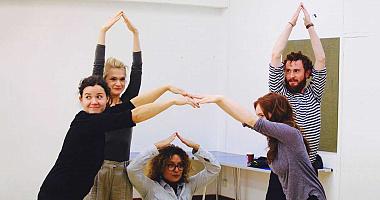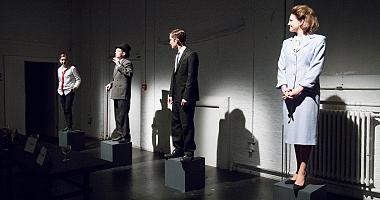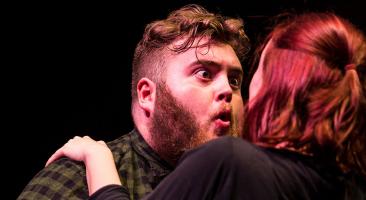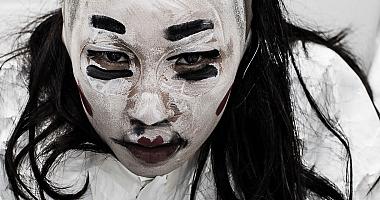MA
Performance Making
Content navigation menu
Why study MA Performance Making at Goldsmiths
This international MA gives you the opportunity to develop your practice as an independent and collaborative performance practitioner. It invites you to explore and experiment with live, digital, intermedial and socially and politically engaged performance.
Develop your own performance practice
- The MA Performance Making programme fosters a creative-critical, experimental and interdisciplinary approach to performance. You’ll study with and learn from a diverse range of practitioners from different creative disciplines, exploring your own practice through performance-making.
- You’ll gain both practical and critical skills in composing performance, while being encouraged to question, challenge, and reconfigure what performance-making is.
- During your studies, you’ll be guided to create a portfolio of performances and writings that are designed to let you experiment, take risks and push your own boundaries in a rigorous and supportive learning environment, expanding and transforming your practice.
- You’ll have the opportunity to take part in a final-year degree show, showcasing your work and celebrating the culmination of your studies.
Practice as research approach
- Performance-making is a mode of enquiry that considers performance as a strategy to think about art, culture and the contemporary world. This practice-as-research approach is embedded throughout the programme.
- You’ll be encouraged, guided and supported to become an articulate practitioner and a creative thinker; able to conceive, make, critique, and write about your own or others’ performance.
Study collaboratively and independently
- You‘ll engage with performance-making as a collective act, and collaboration is built into the structure of the course. You will work with and alongside fellow students and staff with different specialisms. This international community of colleagues and collaborators will enrich your studies.
- You’ll also undertake independent practice and research, giving you the opportunity to focus on your specialist areas of interest in performance-making.
Gain skills and experience in scenography
- A hands-on introduction to performance technologies (lighting, sound, media) will give you the skills and confidence to integrate scenography into your performance-making.
- You'll learn from a dedicated team of theatre designers and technicians both in class and as you develop and put on your assessed performances.
- You’ll learn production management, curation and event organisation culminating in a student-led public performance festival in the Summer Term.
Contact the department
If you have specific questions about the degree, contact Katja Hilevaara.
Length
1 year full-time or 2 years part-time
Entry requirements
You should have (or expect to be awarded) an undergraduate degree of at least 2:1 standard in a relevant subject. You might also be considered if you have relevant experience and can show you have the ability to work at postgraduate level.
Fees
Home - full-time: £10350
Home - part-time: £5175
International - full-time: £19520
Department
What you'll study
You'll complete the following compulsory modules:
| Module title | Credits |
|---|---|
| Performance Research Portfolio | 30 credits |
| Performance Portfolio 1: Interdisciplinary Project | 30 credits |
| Performance Portfolio 2: Site | 30 credits |
| Performance Portfolio 3: Independent Research Project | 60 credits |
In addition to these modules, you will choose a 'contextual' lecture/seminar based module of 30 credits.
Note about optional modules (if available): The above is indicative of the typical modules offered, but is not intended to be construed or relied on as a definitive list of what might be available in any given year. The module content and availability is subject to change.
Teaching
You’ll be taught in workshops, seminars and lectures and will be expected to work independently in response to weekly creative tasks, reading and other research, as well as rehearsals and performance design.
Classes will also take place on field trips to London arts organisations and venues, or other specially selected locations in and around the city.
You’ll learn from our dedicated staff team of practitioner-researchers. You’ll also benefit from guest lectures and workshops delivered by internationally distinguished artists and scholars.
Facilities
As a Goldsmiths drama student you will have access to our fully equipped George Wood Theatre, five studios and our design spaces, which include a sound and media studio and well-equipped workshops for set construction and costume making.
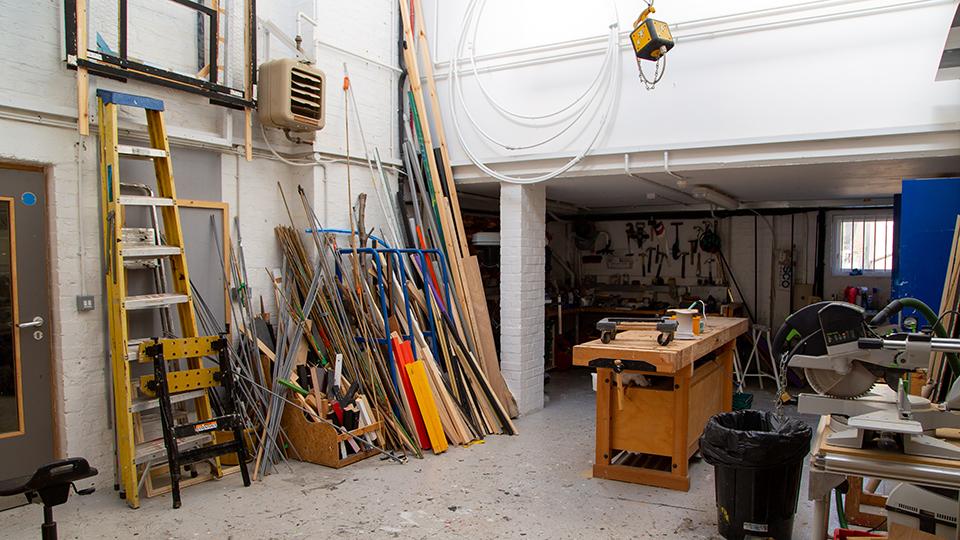
Set construction workshop
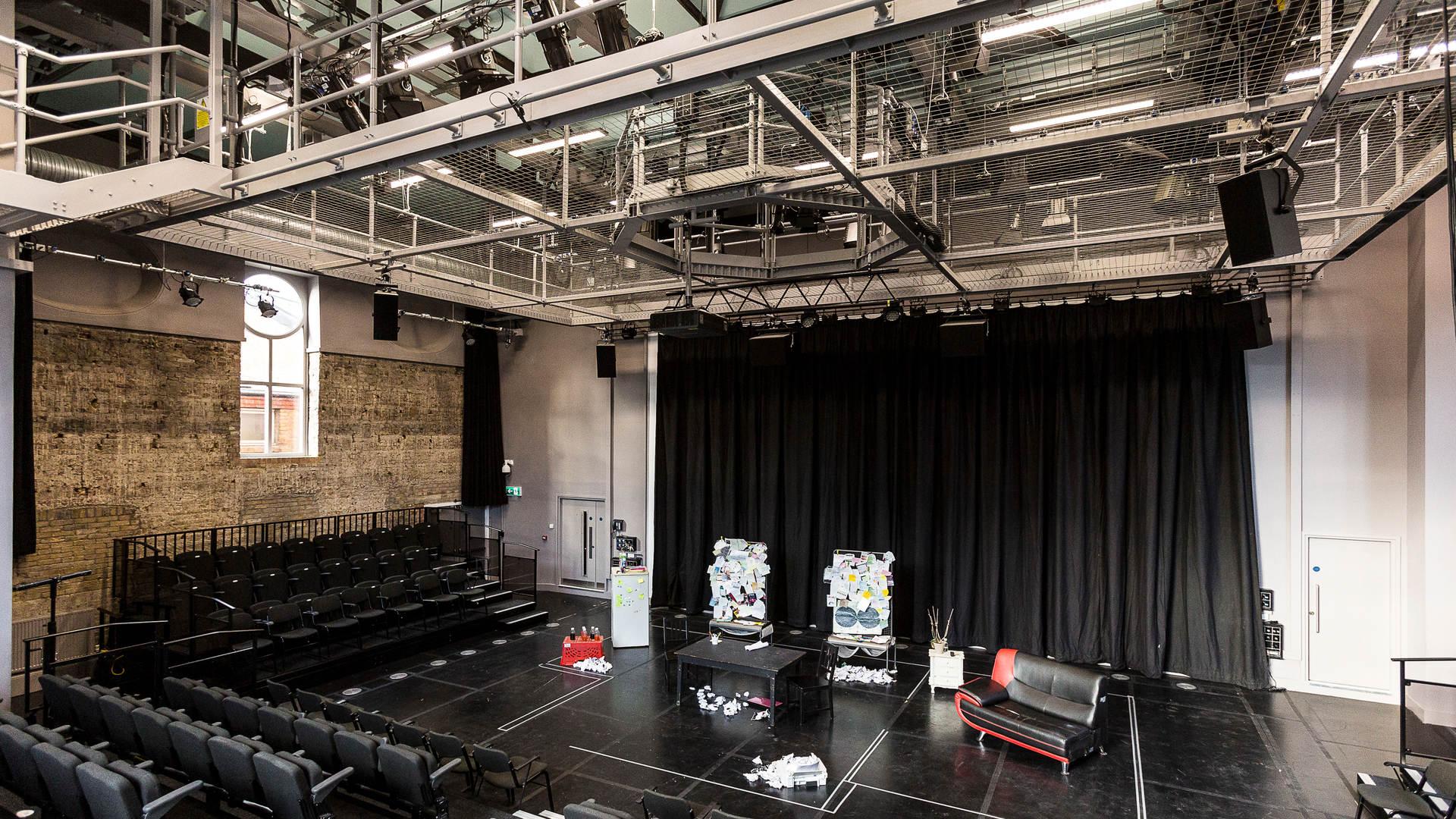
George Wood Theatre
Entry requirements
We welcome candidates to the programme who are interested in exploring their own creative practice through performance making, and who demonstrate a competence for independent research and a keenness to work collaboratively. You are expected to have some experience in the fields of theatre and performance, usually evidenced in a personal statement and expanded in an interview. Otherwise you should be able to show an understanding of how performance might complement your unrelated creative experience.
Qualifications
You should have (or expect to be awarded) an undergraduate degree of at least upper second class (2:1) standard in a relevant/related subject.
You might also be considered for some programmes if you aren’t a graduate or your degree is in an unrelated field, but have relevant experience and can show that you have the ability to work at postgraduate level.
International qualifications
We accept a wide range of international qualifications. Find out more about the qualifications we accept from around the world.
If English isn’t your first language, you will need an IELTS score (or equivalent English language qualification) of 6.5 with a 6.5 in writing and no element lower than 6.0 to study this programme. If you need assistance with your English language, we offer a range of courses that can help prepare you for postgraduate-level study.
How to apply
Apply directly to Goldsmiths using our online application system
Before submitting your application you’ll need to have:
- Details of your academic qualifications
- The email address of your referee who we can request a reference from, or alternatively a copy of your academic reference
- Copies of your educational transcripts or certificates
- A personal statement – this can either be uploaded as a Word Document or PDF, or completed online. Please see our guidance on writing a postgraduate statement
You'll be able to save your progress at any point and return to your application by logging in using your username/email and password.
Please note: the deadline for applications is 31 January. Selected candidates are interviewed by the programme director from February onwards and the results are processed within three weeks of the interview. If you need an earlier interview due to scholarship applications, please contact the Admissions Team.
When to apply
We accept applications from the beginning of October until 31 January for students wanting to start the following September.
We encourage you to complete your application as early as possible, even if you haven't finished your current programme of study. It's very common to be offered a place that is conditional on you achieving a particular qualification. Late applications will only be considered if there are spaces available.
Selection process
Admission to the programme is by interviews which are held in late February/March.
Find out more about applying.
Fees and funding
Annual tuition fees
These are the PG fees for students starting their programme in the 2024/2025 academic year.
- Home - full-time: £10350
- Home - part-time: £5175
- International - full-time: £19520
If your fees are not listed here, please check our postgraduate fees guidance or contact the Fees Office, who can also advise you about how to pay your fees.
It’s not currently possible for international students to study part-time under a student visa. If you think you might be eligible to study part-time while being on another visa type, please contact our Admissions Team for more information.
If you are looking to pay your fees please see our guide to making a payment.
Funding opportunities
Find out more about postgraduate fees and explore funding opportunities. If you're applying for funding, you may be subject to an application deadline.
Additional costs
In addition to your tuition fees, you'll be responsible for any additional costs associated with your course, such as buying stationery and paying for photocopying. You can find out more about what you need to budget for on our study costs page.
There may also be specific additional costs associated with your programme. This can include things like paying for field trips or specialist materials for your assignments. Please check the programme specification for more information.
Research
The Performance Research Forum (PRF)
The Performance Research Forum is a meeting ground between contemporary practitioners, researchers, students and staff at Goldsmiths as well as the general public via a programme of cutting-edge talks, events and performances.
A PRF event might be the sharing of a work-in-progress, a platform for decoding an unfamiliar form, or the opportunity for an artist to show and discuss their work with the audience.
Careers
Where this degree can take you
Graduates from the programme typically go on to work as employable performers and researchers, cultural leaders and programmers, and innovators and collaborators in the performing arts both in the UK and internationally.
Some teach at school, college and university level and provide freelance workships, while others continue their practice-based research at PhD level, with several returning to the department for this after graduating from the MA.
Many find work in related areas of the profession, including as programmers, venue directors, project leaders, market development directors, dramaturges and directors.
What some of our alumni are doing now
Skills
You will gain skills in an ability to conceive, prepare for, contribute to and execute original performance material.
You are also expected to become proficient in articulating research questions, aims and outcomes, and critically situating your own practice within the field of contemporary performance while also developing your critical writing skills.
You will develop a range of transferable skills to equip you for professional employment in a wide variety of contexts, in particular collaborative and interdisciplinary environments that require effective communication, organisation, collaboration and decision-making.
Find out more about employability at Goldsmiths.


